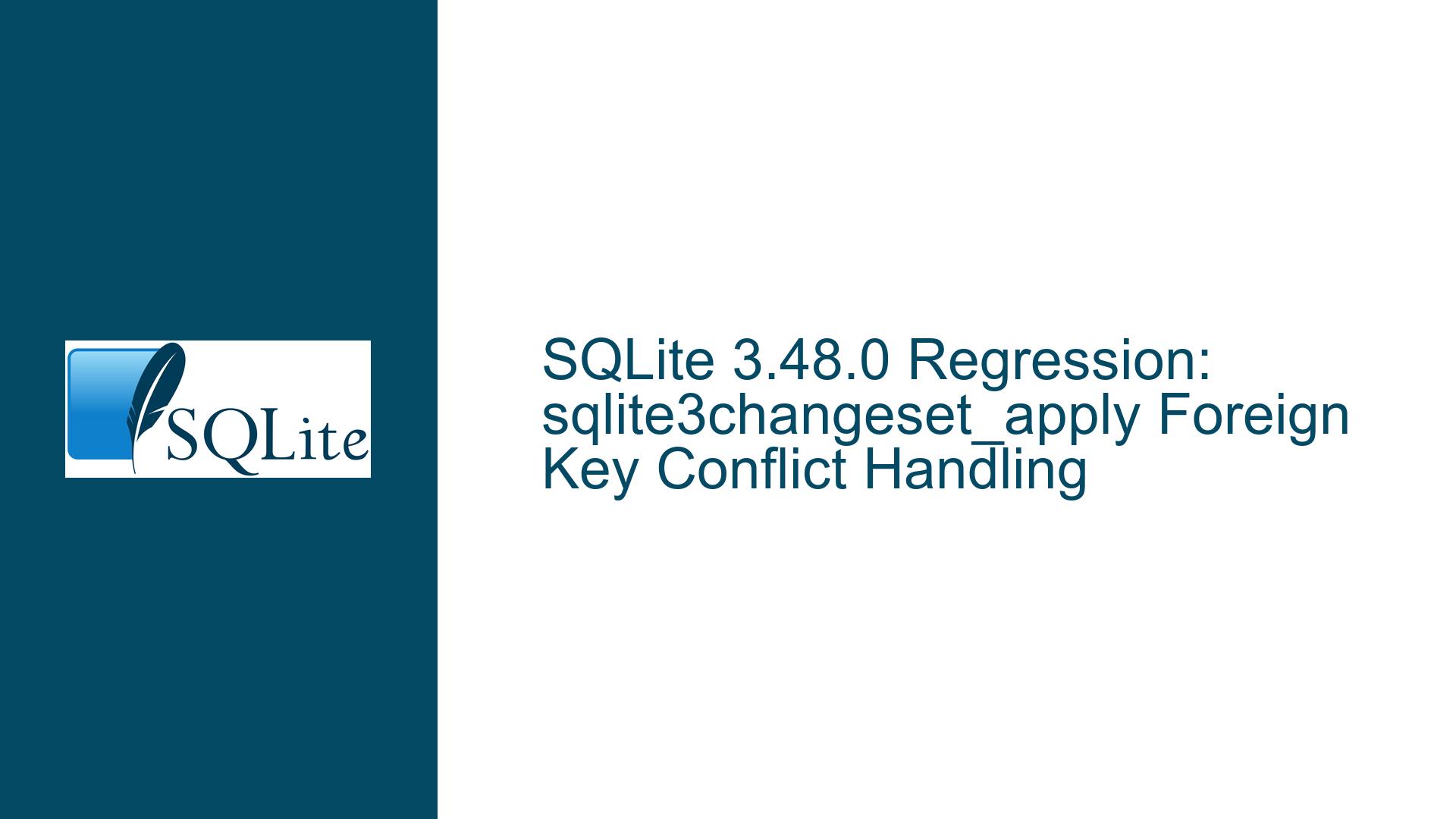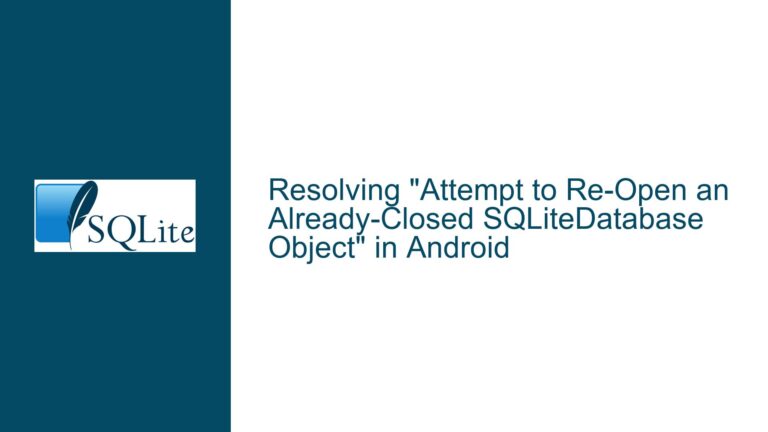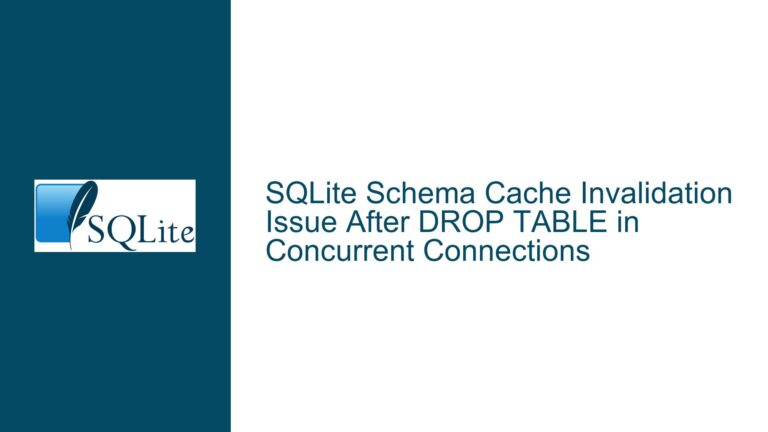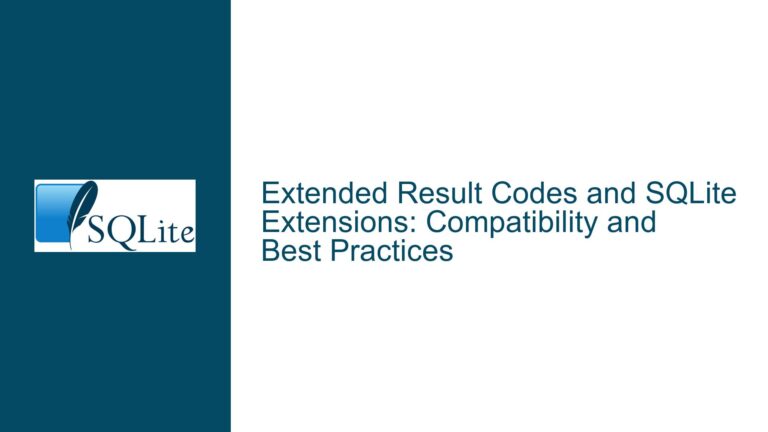SQLite 3.48.0 Regression: sqlite3changeset_apply Foreign Key Conflict Handling
Issue Overview: Changes in sqlite3changeset_apply Behavior for Foreign Key Conflicts
In SQLite 3.47.2, when a changeset application encounters a foreign key conflict and the conflict handler returns SQLITE_CHANGESET_OMIT, the sqlite3changeset_apply function would return SQLITE_OK. This behavior indicates that the conflicting change was successfully omitted, and the operation proceeded without further issues. However, in SQLite 3.48.0, this behavior has changed. Now, sqlite3changeset_apply returns SQLITE_CONSTRAINT even when the conflict handler explicitly returns SQLITE_CHANGESET_OMIT. This regression has significant implications for applications relying on the previous behavior, particularly those using SQLite’s session extension for change tracking and synchronization.
The issue manifests when applying a changeset that includes a deletion operation on a row referenced by a foreign key constraint in another table. In the provided example, the data table has a primary key column key, and the other table has a foreign key column ref that references data(key). When a row in the data table is deleted, and the other table still contains a row referencing the deleted data row, a foreign key conflict arises. In SQLite 3.47.2, the conflict handler could return SQLITE_CHANGESET_OMIT to skip the conflicting change, and sqlite3changeset_apply would return SQLITE_OK. In SQLite 3.48.0, the same scenario results in sqlite3changeset_apply returning SQLITE_CONSTRAINT, which is unexpected and incorrect given the conflict handler’s explicit instruction to omit the change.
This regression was discovered during the update of SQLite to version 3.48.0 in the Node.js project, where it caused test failures and unexpected behavior in applications relying on the session extension for change tracking and synchronization. The issue is particularly problematic because it breaks backward compatibility and requires changes in application logic to handle the new return value correctly.
Possible Causes: Changes in Conflict Resolution Logic in SQLite 3.48.0
The root cause of this regression lies in changes to the conflict resolution logic within the sqlite3changeset_apply function in SQLite 3.48.0. Specifically, the handling of foreign key conflicts when the conflict handler returns SQLITE_CHANGESET_OMIT has been altered. In SQLite 3.47.2, the function would correctly interpret SQLITE_CHANGESET_OMIT as an instruction to skip the conflicting change and continue with the application of the changeset. However, in SQLite 3.48.0, the function incorrectly interprets this as a constraint violation, leading to the return of SQLITE_CONSTRAINT.
This change in behavior could be due to several factors. One possibility is that the internal logic for handling foreign key constraints was modified to enforce stricter validation, inadvertently affecting the conflict resolution process. Another possibility is that the conflict resolution logic was refactored, and a bug was introduced that causes the function to misinterpret the conflict handler’s return value. Additionally, changes in the session extension’s handling of changesets or foreign key constraints could have contributed to this regression.
The issue is further complicated by the fact that the conflict handler’s return value is intended to guide the resolution of conflicts, and SQLITE_CHANGESET_OMIT is explicitly designed to instruct the function to skip the conflicting change. The fact that sqlite3changeset_apply now returns SQLITE_CONSTRAINT in this scenario suggests that the function is no longer respecting the conflict handler’s instructions as it did in previous versions.
Troubleshooting Steps, Solutions & Fixes: Addressing the Regression in sqlite3changeset_apply
To address this regression, the first step is to verify the behavior of sqlite3changeset_apply in SQLite 3.48.0 and confirm that it indeed returns SQLITE_CONSTRAINT when the conflict handler returns SQLITE_CHANGESET_OMIT. This can be done by running the provided reproduction code or a similar test case that triggers a foreign key conflict and uses a conflict handler to return SQLITE_CHANGESET_OMIT. If the function returns SQLITE_CONSTRAINT, this confirms the presence of the regression.
Once the regression is confirmed, the next step is to apply the fix provided by the SQLite development team. The fix, which is available in the commit referenced in the discussion, addresses the issue by restoring the previous behavior of sqlite3changeset_apply. Specifically, the fix ensures that the function returns SQLITE_OK when the conflict handler returns SQLITE_CHANGESET_OMIT, even in the presence of a foreign key conflict. This fix can be applied by updating to a version of SQLite that includes the commit or by manually applying the changes to the SQLite source code.
After applying the fix, it is essential to re-run the test suite to verify that the regression has been resolved. This includes running the reproduction code and any additional tests that were affected by the regression. If the tests pass and the function behaves as expected, this confirms that the fix has successfully addressed the issue.
In addition to applying the fix, it is important to review the application logic that relies on sqlite3changeset_apply to ensure that it correctly handles the return values of the function. This includes checking for SQLITE_OK and SQLITE_CONSTRAINT and ensuring that the application responds appropriately to each return value. If the application was updated to handle the new behavior introduced by the regression, it may need to be reverted to its previous state to align with the restored behavior.
Finally, it is recommended to monitor the SQLite release notes and changelogs for any future updates or changes that may affect the behavior of sqlite3changeset_apply or the session extension. Staying informed about changes in SQLite can help prevent similar issues from arising in the future and ensure that applications remain compatible with the latest versions of the database.
In conclusion, the regression in sqlite3changeset_apply in SQLite 3.48.0 is a significant issue that affects applications relying on the session extension for change tracking and synchronization. By understanding the issue, identifying the root cause, and applying the provided fix, developers can address the regression and restore the expected behavior of the function. Additionally, reviewing and updating application logic to handle the return values of sqlite3changeset_apply correctly can help prevent similar issues in the future.






